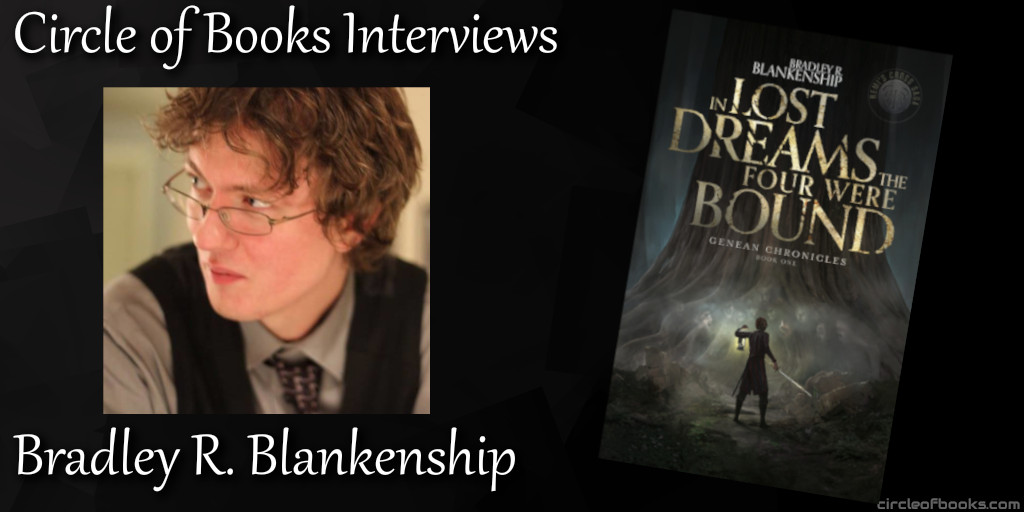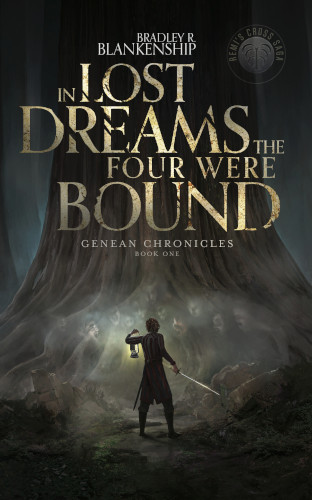Interview Bradley R. Blankenship

Interview
– When did you start writing novels, what moved you to start writing?
Growing up, I used to play make-believe with my friend Clayton. We’d come up with these stories about guardians exploring different worlds, confronting powerful threats, and many general fantasy tropes. I continued these games with my newfound brother Todd after my great grandfather passed away. By that point, I had taken an interest in software because of my love of video games. I enjoyed the stories and character drama in a lot of Japanese RPGs. Those were the types of games I wanted to make and why I learned software engineering.
In college, I realized that, while I wanted to make games, my ideas were far more traditional in structure to the stories you see in a movie or book. That was when I started putting pen to paper.
So I guess I’ve always wanted to tell and make stories. Turning them into books just came later.
– In what genres do you write? Do you plan writing in other genres?
I tend to stick to fantasy and horror, with hard sci-fi and more edgy elements thrown in. I’ve done a few odd entries for fun in romance, erotica, mystery, and general fiction. Yet even in those, aspects of the supernatural seem to creep in. Someday, I plan to write something more absurdist, as I’ve enjoyed quite a few novels with very odd story elements or presentation.
– Tell us about your novels. Why should everyone buy them?
If you enjoy musing about character histories, imagining where the larger plot is going, or enjoy genre-bending stories, then I’d recommend my books. I wouldn’t say they are “unique” in any one way. But I tend to pull together tropes and ideas not present in any one genre or media platform, which potentially gives the books a different feel from other works you’ve read. And while the next two books pick up the pace, you don’t want to come in blind.
– What is your all time favorite novel/book? What makes it special?
This is a hard one. Since college, “House of Leaves” has been my favorite book. I enjoy its multi-layered narrative, the absurd presentation of the stories, and spending time digging for new takeaways each time I read it. It’s an excellent psychological horror mystery that plays on your perception of how a story “should” unfold. Prior, I would have probably said the original Dragonlance series by Margaret Weis and Tracy Hickman. Just for the intricately developed characters and consistent world-building they did with those novels. I also have to give the Dark Tower series a callout, though I felt books five onward were substantially weaker. Come on, Stephen, why’d you redo the first book? The moral ambiguity of Roland is tantamount to his character progression through the series!
– Tell us a bit about your writing process.
My process starts with me trying to figure out where I want my characters to be at the end of a story. I then use that to piece together what the structure should be, which events of the larger narrative (if any) will be covered, and then outline the plots that lead there. I then begin to look at my characters to understand what it takes to end up where I want them. This revolves around asking myself, “What are the character’s motivations?” I then, more often than not, detour into understanding their history. That then feeds back into their motivations and often their hangups or flaws. If I can’t chart a path from where a character begins (strengths, weaknesses, etc.) to where they end up through their motivations, then I’ve done something very wrong. Afterward, I put pen to paper and see where the story takes me. Lastly, I re-evaluate the work once I’ve got a first draft done, using all of the above as my rubric. I find if I’ve missed a scene, overstayed a chapter, or have gone off the rails. I take that into my second draft, which is where I start to consider external editing. Everything after that begins the spiral of marketing, outreach, and whatnot. Each of those topics could be a novel in and of themselves.
– What author would you love to have dinner with?
It would be a toss-up between Stephen King, Edgar Alan Poe, and Mark Twain. Stephen King would be a fun, more than likely awkward, dinner followed by bouts of life stories with odd twists and turns. Poe would edge toward emphasizing the tragedies in both our lives as we drown away our sorrows. And Twain would be fun to talk up and down about every literary and political topic that’d come to mind, progressing into ever angry, angsty rants.
– Tell us about your hobbies and passions other than writing.
I’m a software engineer by trade, with a specialization in mathematics, computer science, and game development. I enjoy video games of all sorts with particular interests in RPGs, Japanese RPGs, and those with decently high skill ceilings. I also enjoy solving challenging mathematical problems, learning and practicing new cooking techniques, and taking a strong interest in different marketing techniques. I also enjoy running tabletop games and have become interested in streaming as a cross-media branding strategy. I also like building and fiddling with most anything.
– We have many followers who would like to start writing a book or are already writing their first novel, any advice for these brave people?
Just keep writing. Oh, and hand over most of your editing to an editor or two. I spent over two years editing the “final” copy of my book. I did catch some fun structural problems. But overall, I primarily wasted a bunch of time I could have spent writing the next book. I suggest more than one final editing pass with an editor. This is so you can do high-level structural edits. Then the editor does their first pass. Then you can incorporate and do a light touch pass. Then, hopefully, the last editor is just catching whatever you and the previous editor missed. But really, try to farm that work out. It’s too easy to get caught up trying to make something perfect when you just need “good enough.”
– How often do you write, daily, every other day or?
I write daily but not always on my projects. This is due to having to write “a lot” for my day job. I try to spend at minimum 45 minutes a day writing my novels, though. That way, even if I only get a couple of pages in, I’m still making progress.
– Do you keep a notebook with ideas for your books? If so do you carry the notebook with you so you won’t forget any ideas?
Not a physical notebook, but I do keep a repository of writing prompts, character studies, and random ideas. These all get committed to a git repo on GitLab that I can sync anywhere, whether on a PC, my phone, laptop, etc.
– How important is it to have your facts right and are there any instances when you bend history to fit your story?
Keeping my facts straight is super important to me, primarily as a world-builder for my stories. Given I write about fantastical places, I usually start from a place of established reality for the world. I then try to account for what the characters “think” they know. And then go from there. But at the end of the day, there has to be a well-grounded, well-understood history for the world. One that can be “misremembered” or “interpreted” as the story develops.
– What are you reading at the moment?
Other than going through another pass of “House of Leaves,” I’m also reading a few fantasy novels. “Necromantica” and “The Heathen King.” I’m not far enough into the other two yet to comment, though.
– How is it to be an author in your country? Do you have a good support from the local public?
The USA is a big, competitive market. I find it has such a broad, diverse appeal that it’s hard to say you get a ton of individual support. But you also have a vast field to peddle your works. There are a lot of venues to get your ideas out there. But it’s also a country where you have to be very engaged with the process to get anywhere.
– Certainly you have had some interesting episodes as an author, fans related or others, share one of them with us.
None as of yet. Maybe someday I’ll message you to change this out with something a little more interesting.
– A final message for our circleofbooks.com readers.
I appreciate everyone taking the time to read what I’ve had to say. I look forward to more comments, reviews, and any feedback readers have to give. Once more, thanks so much for taking time out of your day for an indie. And look forward to “Bound by Light and Fractured Crystal,” the second volume in the “Genean Chronicles.”
Thank you Bradley R. Blankenship. We at circleofbooks.com wish you much success!
Click here to visit the author page here on Circle of Books.
Tweet

